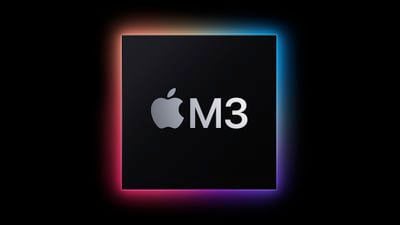Apple's M3 Pro, M3 Max, and M3 Ultra Chips Could Offer Even More CPU and GPU Cores
Apple's upcoming M3 Pro, M3 Max, and M3 Ultra chips could feature more CPU and GPU cores, Bloomberg's Mark Gurman reports.

In his latest "Power On" newsletter, Gurman set out the key changes to the CPU and GPU core numbers of the M3 Pro, M3 Max, and M3 Ultra chips, including how many of the CPU cores are dedicated to performance or efficiency:
|
M2 |
M3 |
| Pro |
10 or 12 CPU cores (6 or 8 high-performance and 4 energy-efficient)
16 or 19 GPU cores |
12 or 14 CPU cores (6 or 8 high-performance and 6 energy-efficient)
18 or 20 GPU cores |
| Max |
12 CPU cores (8 high-performance and 4 energy-efficient)
30 or 38 core GPU cores |
16 CPU cores (12 high-performance and 4 energy-efficient)
32 or 40 GPU cores |
| Ultra |
24 CPU cores (16 high-performance and 8 energy-efficient)
60 or 76 GPU cores |
32 CPU cores (24 high-performance and 8 energy-efficient)
64 or 80 GPU cores |
The standard M3 chip will apparently feature the same CPU and GPU core configuration as the M2 chip, with eight CPU cores (four performance and four efficiency) and ten GPU cores. This chip is expected to be offered in the 13-inch MacBook Pro, 13- and 15-inch MacBook Air, Mac mini, iMac, and iPad Pro.
Apple is also apparently testing MacBook Pro models with 36GB and 48GB of memory, suggesting that new memory options may be available in the future. Currently, the high-end MacBook Pro models can be configured with 16GB, 32GB, 64GB, and 96GB of memory.
Gurman reaffirmed that the first Macs with the M3 chip should debut in October, while Macs with the M3 Pro and M3 Max chips will not arrive until 2024. Macs with the M3 Ultra chip, such as the next-generation Mac Studio, may not arrive until the end of 2024 at the earliest.
Popular Stories
Apple today shared an ad that shows how the upgraded Center Stage front camera on the latest iPhones improves the process of taking a group selfie.
"Watch how the new front facing camera on iPhone 17 Pro takes group selfies that automatically expand and rotate as more people come into frame," says Apple. While the ad is focused on the iPhone 17 Pro and iPhone 17 Pro Max, the regular iPhone...
In select U.S. states, residents can add their driver's license or state ID to the Apple Wallet app on the iPhone and Apple Watch, and then use it to display proof of identity or age at select airports and businesses, and in select apps.
The feature is currently available in 13 U.S. states and Puerto Rico, and it is expected to launch in at least seven more in the future.
To set up the...
Apple is planning to launch new MacBook Pro models as soon as early March, but if you can, this is one generation you should skip because there's something much better in the works.
We're waiting on 14-inch and 16-inch MacBook Pro models with M5 Pro and M5 Max chips, with few changes other than the processor upgrade. There won't be any tweaks to the design or the display, but later this...
It has been a slow start to 2026 for Apple product launches, with only a new AirTag and a special Apple Watch band released so far. We are still waiting for MacBook Pro models with M5 Pro and M5 Max chips, the iPhone 17e, a lower-cost MacBook with an iPhone chip, long-rumored updates to the Apple TV and HomePod mini, and much more.
Apple is expected to release/update the following products...
New MacBook Pro models with the M5 Pro and M5 Max chips could arrive as soon as Monday, March 2, according to Bloomberg's Mark Gurman.
In today's "Power On" newsletter, Gurman said that the release of new MacBook Pro models is tied to the release of macOS Tahoe 26.3. The launch is said to be slated for as early as the week of March 2. He added that the M4 Pro and M4 Max models on sale today...




















